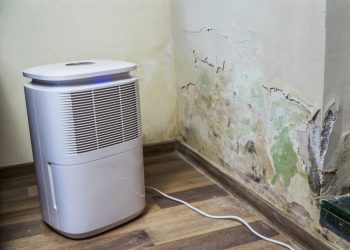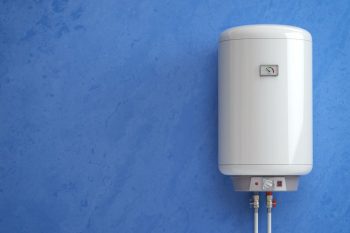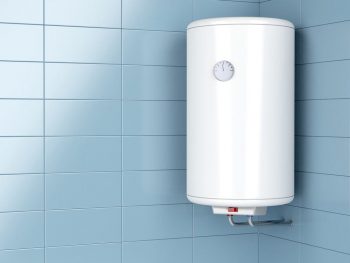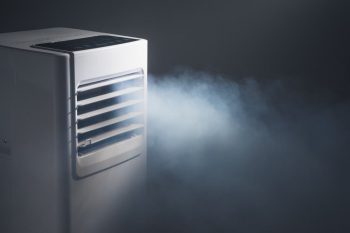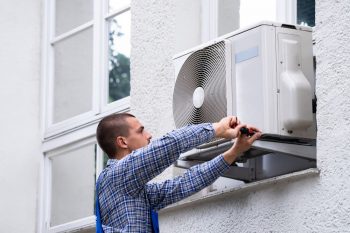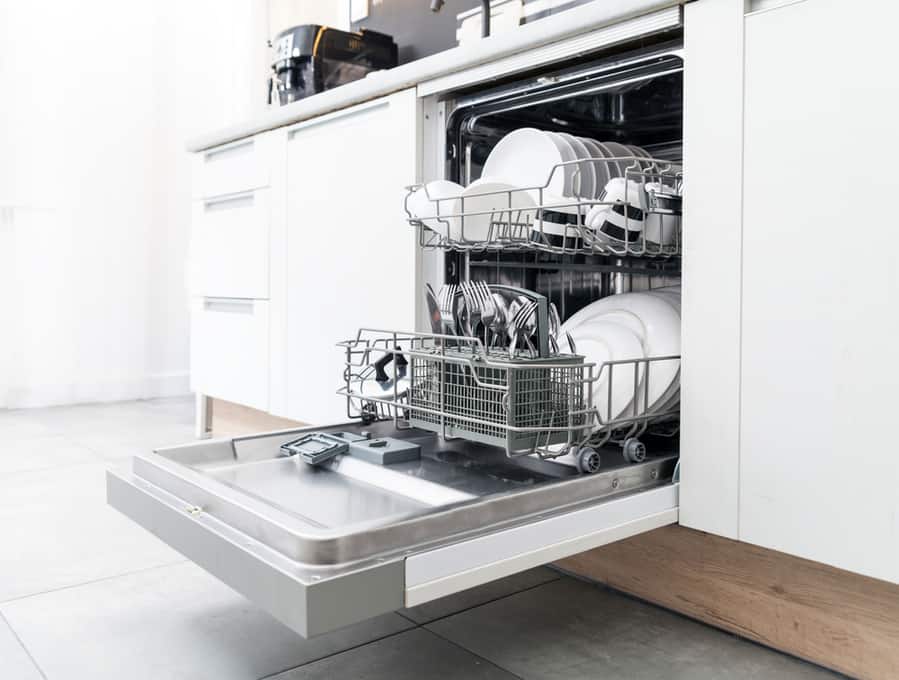
Most modern dishwashers are designed to be noiseless. However, there is still bound to be some normal noise as the machine runs its usual cycles. For example, you can notice hissing sounds as the water moves through the fill valve or clunking sounds as the detergent cup opens.
Also, humming can happen as the water passes through the drain pump or as the soft food disposer grinds food.
Another common noise is rattling. While there are normal rattles, there is also strange rattling that you should diagnose and fix.
It is best to understand the usual noises so that you can quickly identify when your appliance has an issue that needs to be addressed.
- While most dishwasher manufacturers advertise their products as noiseless, there’s still some noise from the machines as they operate.
- Rattling is a common noise that dishwashers produce due to incorrect loading of dishes and cutlery, trapped solid items, faulty motors, worn out or damaged pumps, loose spray arm or drain hose, or the age of a dishwasher.
- Aside from rattling, other dishwasher noises include grinding, buzzing, and humming.
- It is essential to distinguish the cause of each type of noise and when the noise indicates a possible malfunction so that you can troubleshoot or bring in a skilled professional.
This article discusses the reasons a dishwasher might be rattling. We’ll also offer ideas on diagnosing and fixing each issue. Additionally, we’ll talk about other noises that a dishwasher makes and what each noise indicates.
Causes of Dishwasher Rattling
Rattling is a noise that sounds like objects knocking against each other as your dishwasher runs the fill, wash, and drain cycles.
Some of the common causes of dishwasher rattling are:
1. Incorrect Loading of Dishes and Cutlery
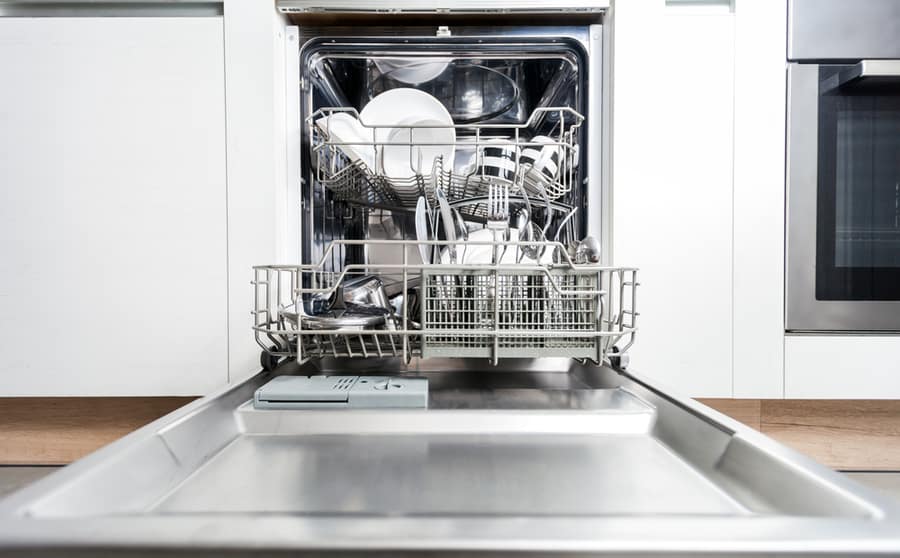
There is a proper way that you should load dishes and cutlery into a dishwasher. Failure to do this results in spoons or forks falling off or hanging from the racks.
When this happens, the items will hit each other or the internal surfaces of the appliance, producing rattling sounds.
The items will also be in the way of the spray arm, preventing it from rotating freely. In addition, having a low load can cause rattling because the water jets will strike the washing tank directly if you don’t distribute the utensils evenly.
How To Fix
If you realize you stacked the dishes and cutlery poorly, the only solution is to stop the cycle and rearrange them.
It is also essential to ensure that light utensils, such as baby bottles, remain intact during the wash cycle. Proper loading will eliminate the rattling and prevent the breakage of your utensils.
In case of a low load, it is best to distribute the utensils evenly or add more dishes.
2. Trapped Solid Item
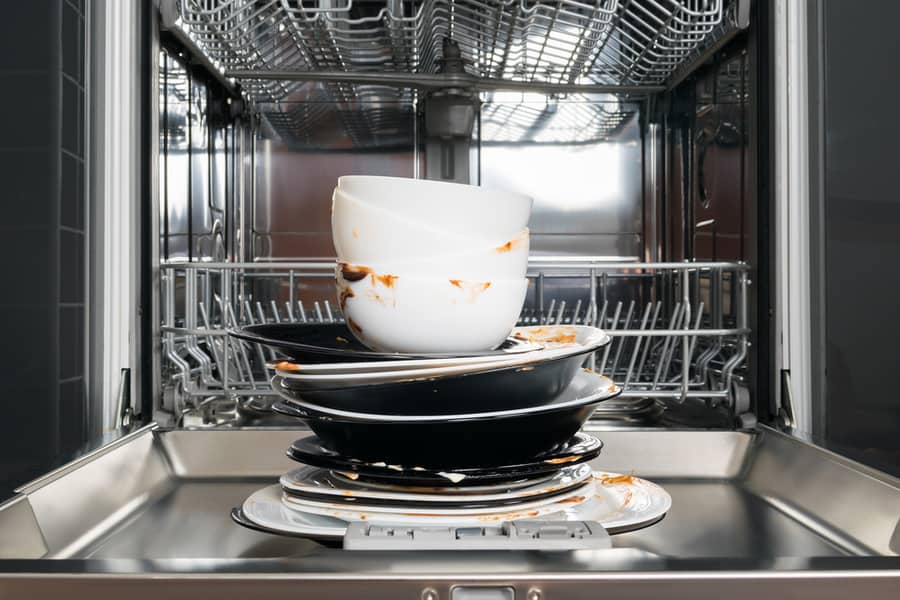
You may have accidentally forgotten to remove hard food debris such as bones, nuts, or eggshells as you load your dishes. This solid debris can get trapped inside the drain pump and cause rattling.
How To Fix
To eliminate rattling caused by a trapped solid item, you must wait until the dishwasher cools and unload the dishes. Afterward, pull the bottom rack, and inspect the appliance floor and drain pump for trapped debris.
The noise should recede after you remove the solid items.
3. Faulty Motor, Worn Out or Damaged Pump
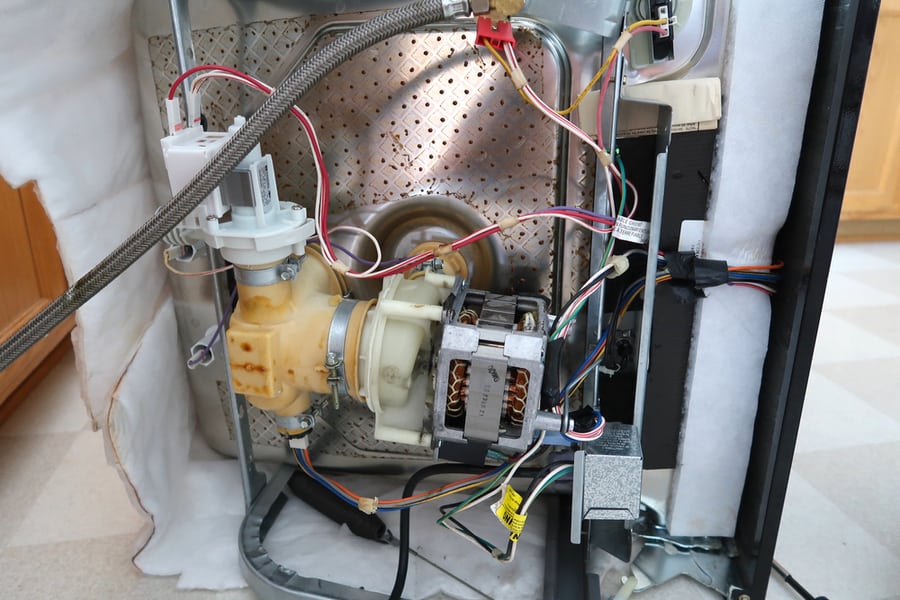
Sometimes, you may have confirmed that you’ve loaded your dishes correctly and even inspected the dishwasher for any trapped debris, but the rattling doesn’t dissipate.
If that happens, it indicates that the issue is caused by a faulty motor, worn-out or damaged pump. Consider running an empty wash cycle to establish that the rattling is not due to poor loading.
Over time, the drain and circulation pump motor bearings become loose due to the effects of wear and tear. This can cause the pumps to be loose, resulting in a rattling noise.
How To Fix
The solution to a faulty motor or damaged pump is to replace the particular pump, whether the circulation or drain pump. It is best to consult a reliable technician when making such a repair.
4. Loose Spray Arm or Drain Hose
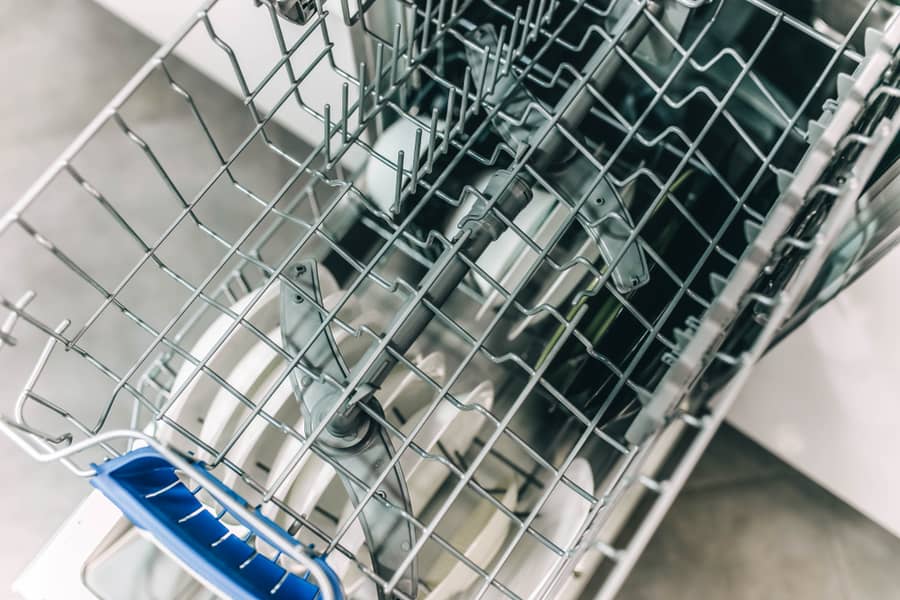
Some dishwashers have one spray arm, while other models may have two. In addition, the spray arms have bearing rings that loosen over time, resulting in a rattling sound during the wash cycle.
Aside from the spray arm, rattling may result from the drain hose hitting the sides of the drainage hole it passes through.
How To Fix
The solution to a loose spray arm or drain hose is to repair or replace them.
5. Old Dishwasher
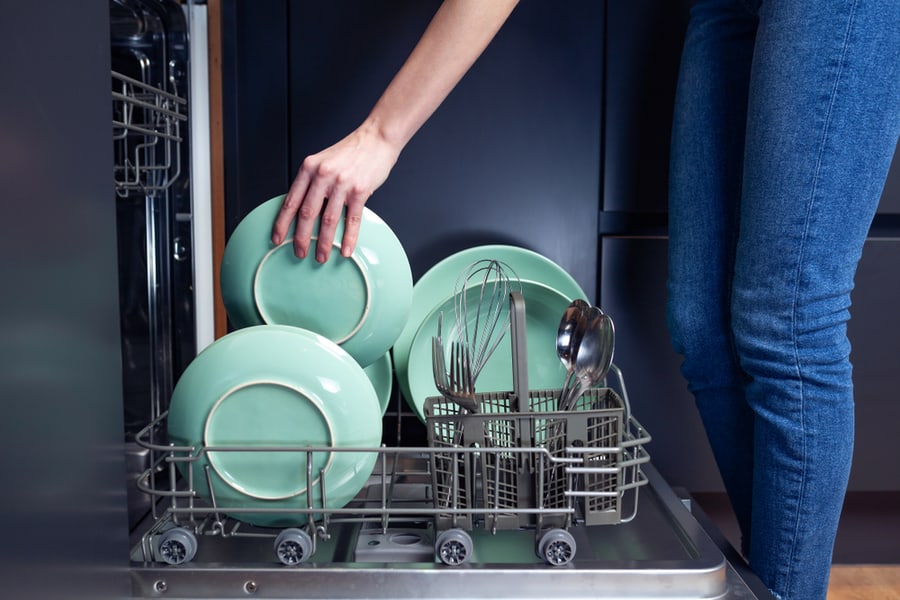
An old dishwasher is bound to have a lot of wear and tear, which can result in rattling. The standard lifespan for a dishwasher is ten years.
How To Fix
When your dishwasher outlives its lifespan, it is best to invest in a new one so that you don’t have to deal with all manner of noises that an old one might produce.
Other Common Noises Made by Dishwashers
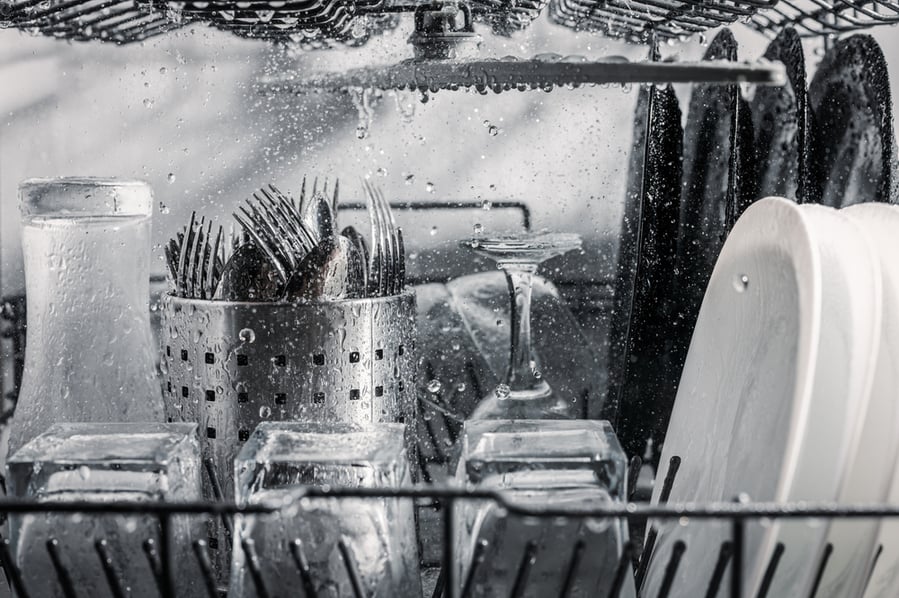
Aside from rattling, you may notice other noises from your dishwasher.
They include:
1. Grinding
A light grinding sound is typical as the dishwasher’s motor runs. However, a high-pitched grinding noise can result from a solid object being stuck in the pump or between the blades of the drain impeller.
This can be a bone, a fork, or a solid object.
Another reason for a grinding noise can be from the water inlet valve when the water getting into the dishwasher doesn’t have enough pressure. This can be because of clogs in the drain pump or circulating pump or due to a worn-out inlet valve.
To fix the grinding noise, you need to check the impeller motor and blades and remove anything that may have stuck in them. Also, it’s important to unblock the pumps and replace the inlet valve if necessary.
2. Buzzing
It is normal for a dishwasher to buzz when it forces water down the drain. However, buzzing might also signify a malfunction in the dishwasher.
The dishwasher’s water inlet valve could close due to blockage and rapid bursts of water vibrating your water pipes. A dirty impeller blade or debris buildup around the drain pump can also produce buzzing sounds.
To fix buzzing sounds, consider cleaning the impeller blade to remove the blockage or replacing the drain pump.
If you have no repair experience, it is best to consult a technician.
3. Humming
Humming is a typical sound dishwasher produces, indicating that the drain pump is running. Also, during the drying cycle, you may notice the machine humming as the fan dries the utensils.
However, if you notice that the machine is humming extraordinarily, there could be an issue with the motor or fan, and it would be best to inspect them.
Conclusion
A rattling dishwasher is not fun to have in your kitchen. Therefore, it is vital to establish the reason causing it to rattle so that you can fix it or call in a skilled professional.
In most cases, you’ll just have to load your dishes properly or remove a stuck item, and the noise disappears.
Frequently Asked Questions
How Can You Fix Rattling in a Dishwasher?
One of the easiest ways to fix a rattling dishwasher is to load it correctly, ensuring that everything remains intact throughout the cleaning cycle.
Removing any solid debris trapped in the drain pump, replacing old motors or pumps, and ensuring that the spray arms and drain hose remain intact when using the machine can also help.
Additionally, you must replace your dishwasher if it has exceeded its lifespan.
What Noise Do Dishwashers Produce When You’ve Loaded Your Dishwasher Incorrectly?
When you load your dishwasher incorrectly, you’re likely to hear thumping or rattling noises as the loose utensils bump against the internal parts of the appliance, including the spray arms, which will not rotate freely.
Why Does a Dishwasher Buzz During the Wash Cycle?
It is usual for a dishwasher to buzz when it forces water down the drain. However, loud buzzing might indicate a water hammer, dirty impeller blade, or debris buildup around the drain pump.

